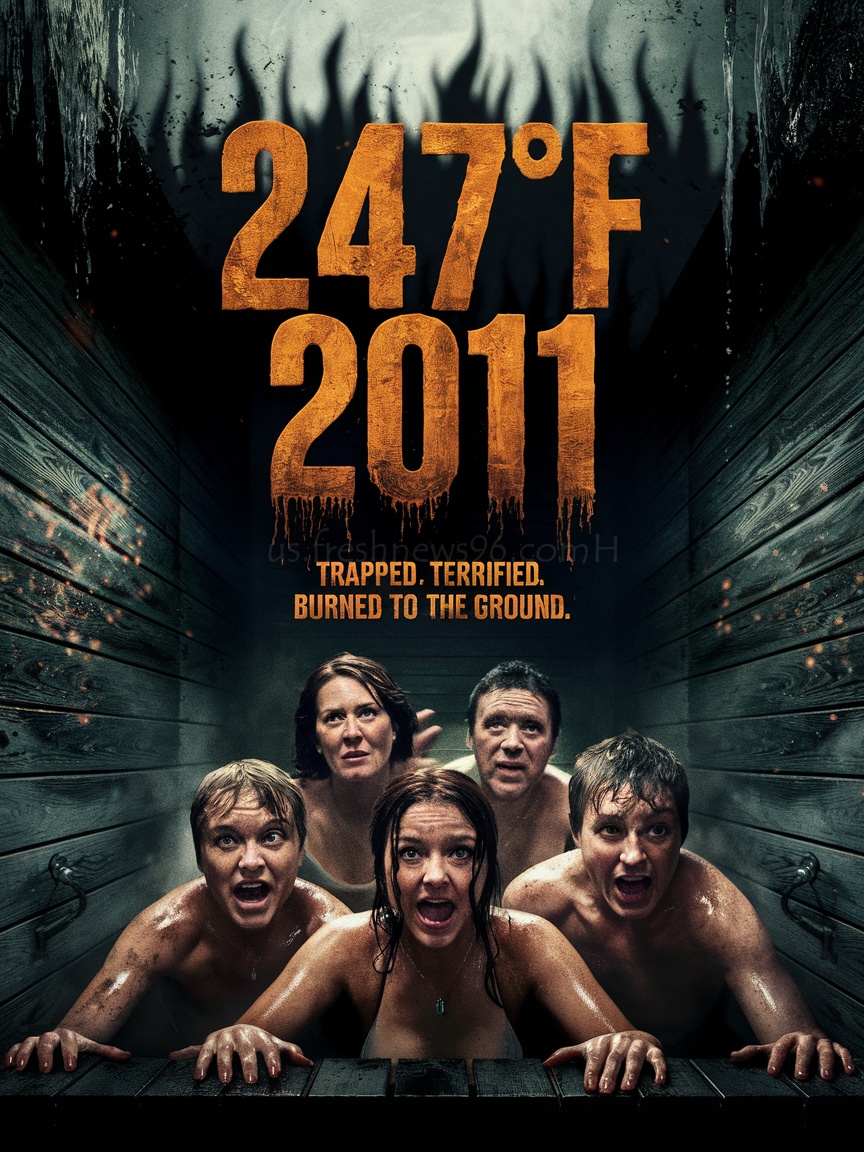247°F (2011)

247°F is a nail-biting survival thriller that traps viewers in a terrifyingly plausible nightmare. Directed by Levan Bakhia and Beqa Jguburia, the film capitalizes on the primal fear of confinement and the relentless effects of extreme heat, delivering a visceral and psychologically intense experience.
Plot Overview
A weekend getaway turns into a harrowing ordeal for four friends—Jenna (Scout Taylor-Compton), Renee (Christina Ulloa), Ian (Travis Van Winkle), and Michael (Michael Copon). They retreat to a lakeside cabin, seeking relaxation and camaraderie. However, a seemingly innocuous decision to enjoy the cabin’s sauna spirals into disaster when the sauna door becomes jammed, leaving them trapped in a sweltering enclosure.
As the temperature rises to lethal levels, the group faces mounting threats of:
- Dehydration
- Heatstroke
- Suffocation
The characters’ fight for survival becomes a test of resilience and teamwork, but as fear and desperation grow, cracks form in their relationships, and primal instincts take over.
Character Dynamics
- Jenna battles lingering trauma from a car accident that claimed her fiancé, forcing her to overcome fear and rediscover her inner strength.
- Ian and Michael clash in a power struggle, highlighting their differing approaches to leadership under pressure.
- Renee, the peacemaker, tries to hold the group together, but her efforts are tested by the escalating tension.
The confined setting amplifies the group’s psychological and emotional unraveling, with each character’s vulnerabilities and strengths brought to the forefront.
Themes
- Survival Instincts vs. Rationality: Examines the fragile balance between clear thinking and panic in life-or-death situations.
- The Psychology of Confinement: Explores how isolation and physical danger expose hidden fears and strain relationships.
- Human Resilience: Highlights both the limits and potential of human endurance in extreme conditions.
- Agency and Fate: Questions the extent of personal control when faced with uncontrollable circumstances.
Cinematography and Visual Style
The film’s claustrophobic aesthetic immerses viewers in the sauna’s oppressive environment:
- Close-up shots emphasize the characters’ sweat-soaked faces, panic-stricken expressions, and frantic attempts to escape.
- The warm, suffocating color palette mirrors the unbearable heat, making the atmosphere almost tangible.
- The tight framing intensifies the sense of entrapment, while the constant hiss of steam and crackling wood creates an auditory backdrop of dread.
Pacing and Narrative
The story’s pacing is taut and relentless, with the rising temperature acting as a metaphorical and literal ticking clock. By avoiding elaborate subplots or unnecessary distractions, the film stays laser-focused on the immediate peril, keeping viewers on edge.
Strengths
- Relatable Premise: The simplicity of the scenario—a jammed sauna door—makes the terror feel grounded and plausible.
- Intense Atmosphere: The film’s commitment to a single, enclosed setting enhances its suspense.
- Psychological Depth: The exploration of group dynamics under stress adds emotional weight to the survival story.
Final Thoughts
247°F is a gripping survival thriller that transforms an everyday situation into an unrelenting nightmare. With its claustrophobic setting, rising stakes, and psychological tension, the film keeps viewers riveted from start to finish.
If you enjoy thrillers that combine realistic dangers with intense character-driven drama, 247°F is a must-watch. Prepare to sweat!











